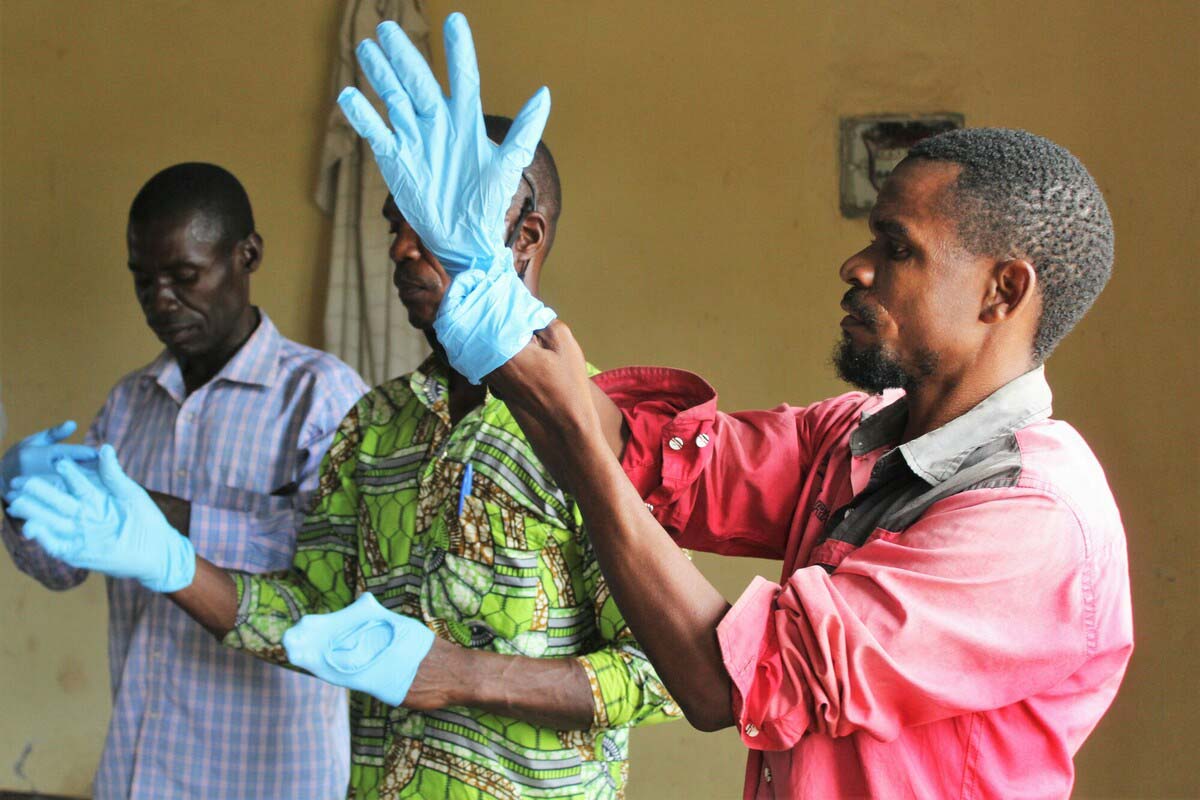
A traditional health practitioner in the Democratic Republic of the Congo takes part in a safe and dignified burial training, led by FHI 360, during the country’s 11th Ebola outbreak. Photo credit: Carly Madison Underwood/FHI 360
While the pace of change around the world has been accelerating rapidly over the last few decades, the pandemic-related lockdowns that began in 2020 precipitated unprecedented transformations.
Those lockdowns destroyed the livelihoods of those with the fewest resources, throwing global supply chains and economies into uncertainty. But we also witnessed the breathtaking speed of vaccine development that saved the lives of millions, and leaps in technology such as telehealth and artificial intelligence are making near-daily breakthroughs.
There were breakthroughs in the international development sector as well, where organizations were forced to rethink the ways they provided assistance. FHI 360 has employed locally led development approaches for decades. But when we were cut off from many of our traditional ways of working, we witnessed how much local organizations could deliver and how much we could rely on them — frankly, much more than the sector had realized.
We need to ensure that this continues; locally led approaches promise to be more sustainable, though more research is needed to understand how to best support them. The very notion of a monolithic “HQ” — the view that there is one “center” for sourcing technical knowledge, expertise and operating standards — seems increasingly dated and is decidedly unhelpful.
Meanwhile, decades of gains in reducing extreme poverty, eradicating malnutrition and infectious diseases, and improving access to education and economic opportunity were effectively wiped out in the last two years — in large part because of COVID-19, climate change and Russia’s invasion of Ukraine. More than 100 million additional people were pushed into extreme poverty, living on less than the equivalent of $2.15 a day. According to the Organisation for Economic Co-operation and Development’s States of Fragility 2022 report, 1.9 billion people, or 24% of the world’s population (and 73% of people living in extreme poverty), are now living in fragile contexts. That’s the largest number since 2007.
Not surprisingly, the U.S. Agency for International Development (one of the largest donors to humanitarian and development efforts) is now directing a much greater share of its funding to programs in fragile and conflict-affected countries. UNHCR, the U.N. refugee agency, estimates that more than 103 million people in the world today have been forcibly displaced. FHI 360 and similar organizations, which have typically delivered health and education programming primarily in low-resource but fairly stable settings, are now increasingly being called on to also operate in insecure contexts with highly mobile displaced populations.
In sum, the development sector faces unprecedented generational challenges, but the approaches we used to adapt to the COVID-19 lockdowns and to confront crises also equipped us with new ways of working to meet them — if we only change how we think about them.
To this end, FHI 360 has embarked on a new organizational strategy, designed to address three of the biggest global challenges we face: eroding social cohesion and increasing inequality; growing global health threats; and proliferating crises.
Read FHI 360’s FY23–25 organizational strategy
So that we can achieve greater agility, responsibility and impact, we are undertaking strategic change initiatives across our organization to ensure that people around the world have access to the tools, skills and knowledge they need to lead full and healthy lives. By improving our agility, we will strengthen our structure and processes for delivering assistance while remaining financially strong. Responsibility reflects our commitments to our global team, society and the planet. And we will magnify our impact by centering and elevating local solutions and leadership, advocating for bold and necessary policy changes, and expanding our support for organizational measurement, innovation and learning to confront those global challenges.
Through this strategy, FHI 360 seeks to foster:
- Inclusive, cohesive and equitable societies and economies with resources, policies and systems that continue to flourish and grow.
- Healthy and thriving communities with equitable access to health services and stronger health systems.
- A reduction in violent conflict and environmental degradation through effective policies, technologies, systems and international cooperation.
We believe that, in conjunction with the communities where we work and in alignment with their most urgent needs, we can — and must — mobilize our research, resources and relationships to help address the most pressing issues that face our planet.
Together, we are working to ensure that opportunity is within reach for everyone, everywhere.
